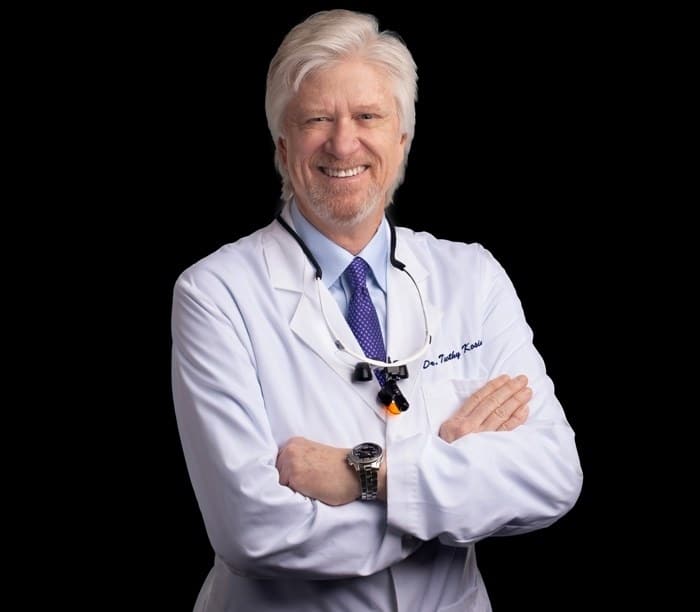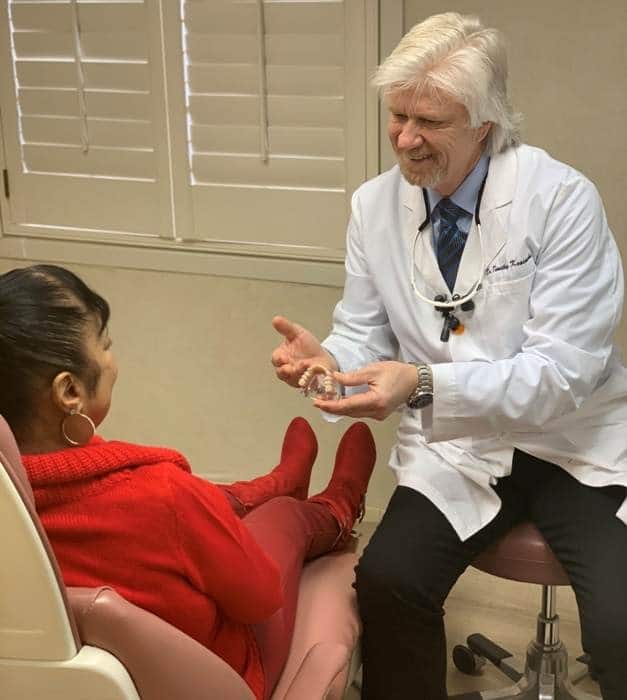Checkout Dr. Timothy Kosinski, DDS Watch Video
For Dr. Kosinski, every patient is different and requires a unique approach to treatment. He truly cares for his patients and is dedicated to providing the best dental care possible. If you have any questions or concerns, feel free to ask during your next visit, and Dr. Kosinski would be delighted to share his insight with you.
Education
Dr. Timothy Kosinski is an Affiliated Adjunct Clinical Professor at the University of Detroit Mercy School of Dentistry and serves on the editorial review board of Reality, the information source for esthetic dentistry and is the past editor of the Michigan Academy of General Dentistry. He is currently the Associate Editor of the AGD journals and is honored to have been named editor of IMPLANTS TODAY, the implant publications of DENTISTRY TODAY.
He is a Past-President of the Michigan Academy of General Dentistry. Dr. Kosinski received his DDS from the University of Detroit Mercy Dental School and his Mastership in Biochemistry from Wayne State University School of Medicine. He is a Diplomat of the American Board of Oral Implantology/Implant Dentistry, the International Congress of Oral Implantologists and the American Society of Osseointegration.
Professional Credentials
He is a Fellow of the American Academy of Implant Dentistry and received his Mastership in the Academy of General Dentistry. Dr. Kosinski has received many honors including Fellowship in the American and International Colleges of Dentists and the Academy of Dentistry International. In 2017 he received the Academy of Dentistry International’s Humanitarian Award “in recognition of significant contributions to the enhancement of the quality of life and the human condition.” He is a member of OKU and the Pierre Fauchard Academy. Dr. Kosinski was the University of Detroit Mercy School of Dentistry Alumni Association’s “Alumnus of the Year,” and in 2009 and 2014 received the Academy of General Dentistry’s “Lifelong Learning and Service Recognition.”
Dental Implants
Dr. Kosinski has placed over 14,000 dental implants and published over 200 articles on the surgical and prosthetic phases of implant dentistry and was a contributor to the textbooks, Principles and Practices of Implant Dentistry, and 2010’s Dental Implantation and Technology. He was featured on Nobelbiocare’s Nobelvision and lectures extensively.
Dental Implants
Our office is widely recognized as one of the top places in Michigan for dental implant services. We serve as a referral source for many other doctors across the state who send patients to us specifically for implant services.
Dental implants are one of the best investments you can make into your long-term well-being. They restore your teeth from root to crown. Whether you’re missing a single tooth or all of them, they’re a fantastic treatment option you should consider.
Technological advances have dramatically improved both implant design and function. They are made of materials that are biologically safe and compatible to the bone and other tissues in the mouth. Once implanted in the jaw, dental implants become part of your mouth and function and feel just like natural teeth.
With dental implants, you will be able to eat, speak, smile, and laugh with confidence again. If you are looking for a dramatically improved smile, want to restore your chewing ability, or if you have a problem with a loose fitting denture, then dental implants are an excellent choice.
Our Dental Implant Solutions
Dental implants are the permanent and comfortable tooth loss solution that empowers you to feel and look your best. Whether you need a single tooth replaced or an entire arch of teeth restored, we have dental implant solutions that will give you a stunning new smile.
Single-Tooth Implants
Ideal for replacing either a single tooth or several teeth throughout of your smile, single dental implants replace missing teeth better than any other tooth loss solution and cause no damage to the natural neighboring teeth.
Multi-Tooth Implants
Multi-tooth implant bridges are a great choice to replace a traditional dental bridge. Unlike conventional bridges that rely on natural teeth to stay in place, implant-supported bridges don’t rely on natural teeth and can even strengthen them by providing support.
Full Arch Replacements
We can also replace full arches of teeth with implant supported dentures. Unlike traditional dentures that are removable, this implant solution stays in your mouth and restores the healthy and attractive appearance of your smile.
Implant- Supported Overdentures
Our implant-supported overdentures are a great option we provide to replace conventional dentures. They are removable for easy cleaning and maintenance, and unlike dentures that require adhesives to stay in place, implant-supported overdentures are firmly anchored to your jaw with dental implants. They provide the full benefits of dental implants with the convenience of traditional dentures.
My teeth are crooked and crowded. Is there a faster way than braces to make them more attractive?
There are many alternative cosmetic solutions such as resin bonding, porcelain veneers and crowns that might apply. Each individual would have to be evaluated to the best course of treatment.
If I’m missing a tooth, do I really need to replace it?
Yes. Replacing missing teeth restores both function and esthetics and will prevent future problems. If a space is left untreated, adjacent or opposing teeth may tip, drift or over erupt leading to bite problems, periodontal disease and/or tooth decay.
How can I make my teeth look whiter?
There are several alternatives. They may be bleached to reverse discolorations of the enamel (outer layer of tooth crown), bonded with a tooth-colored resin to cover stains or restored with porcelain veneers.
Will my teeth become sensitive if I have them bleached?
Sensitivity may result in only 10% of all patients who have their teeth bleached. In these instances, there are other agents that can be utilized to desensitize their teeth.
What causes teeth to discolor?
Teeth tend to darken as we age. However what we eat and drink play an important role. Red wine, tea, coffee, various berries, cranberry juice, soy sauce and soda are all contributing factors.
Are home whitening kits effective?
Yes, depending on the type of staining or discoloring. Use commercial products that contain 10%, 16%, or 22% hydrogen peroxide or carbamide peroxide. Laser teeth whitening technology is available in the dental office and utilizes a stronger bleaching agent.
What is the difference between porcelain and gold as a restorative material?
While gold is stronger than porcelain, it is not very cosmetic and cannot be bonded to the tooth. Porcelain can simulate tooth color and by bonding it to a tooth, it becomes strong enough to resist normal chewing forces.
What is the difference between a cap and a crown?
They both refer to the same type of full-coverage restoration. If a tooth is severely broken down, a crown (cap) is fabricated that will cover the entire tooth and restore it to its natural shape and function. When esthetics is important porcelain will be used.
What are porcelain veneers?
They are thin shells of tooth-colored porcelain that are bonded to the front surface and biting edge of your upper or lower teeth. Minimal tooth reduction is necessary, and they can be used to close spaces, straighten teeth, cover stained teeth and/or create better-proportioned teeth.
Can I change the old silver fillings in my teeth?
Yes. There have been revolutionary changes in tooth-colored resins and porcelain materials. There are many alternative restorations that provide both cosmetics and the strength of amalgam fillings, especially in back teeth.
What can be done about my chipped teeth?
There are several alternative available treatments including resin bonding to reform the tooth, porcelain veneers and/or porcelain crowns. Factors that are important in determining the treatment are the vitality of the tooth, the size of the chip and the patient’s bite.
Can my youthful smile be recreated even though my teeth have worn down over the years?
In many instances, the answer is yes, even if there is a combination of broken, missing, shifted and worn teeth. However, situations like this will need full-mouth reconstruction to restore function, comfort and a your original smile.
Is there something, other than a removable appliance to replace my missing back teeth?
Yes. You can have dental implants that will support fixed artificial teeth. The implants are titanium root-like structures that are placed in your jaw and become attached to the bone; these teeth do not have to be removed and will function like your original natural teeth.
How successful are dental implants?
Most published studies indicate 90-98% success when the patient has favorable conditions. These include being in good health, a lack of systemic problems such as uncontrolled diabetes or heavy smoking, proper implant placement and prosthetic design, appropriate bite adjustments and good maintenance and home care.
Is age a deterrent to having implant therapy?
Not in itself. More important is the health of the patient. A 70 or 80 year-old patient in good health may be a better candidate than a younger patient with systemic problems, especially a person that is motivated to improve their quality of life and is willing to maintain good oral hygiene.
How many implants will I need?
As a general rule, each missing tooth should be replaced with one implant. However, often due to financial or anatomical limitations, this may not be possible and compromises will have to be made. Before proceeding, proper diagnosis from clinical examination, x-rays and models will help determine the outcome.
Are implants covered by dental insurance?
Unfortunately, at this point most dental insurance companies do not cover implant treatment. The prosthetic restoration, supported by the implant, may have coverage depending on the company, and sometimes, medical insurance covers part of the surgical placement. Patients must set their own priorities and measure a lack of insurance coverage against an improved quality of life.
How do I know if I am a candidate for dental implants?
There are two basic criteria for people who desire dental implants.
1. You must be relatively healthy, meaning no uncontrolled medical problems, such as uncontrolled diabetes, uncontrolled hypertension, or immunosuppressive diseases.
2. You must have enough bone to be able to place something in to it.
What are dental implants?
Another name would be tooth-replacement therapy. Dental implants are titanium fixtures that take the place of the missing tooth’s root.. They are used to attach a single tooth, multiple teeth or even to stabilize a denture so it does not move around.
Are the procedures painful?
Most people relate that the implant placement procedure is similar to a simple or easier extraction. You are slightly sore, but not debilitated. Many state that following the procedure that if they knew what the surgery was going to be like, they would have done it a long time ago. Everyone is different, however, so our patients are provided the proper pain medications, as necessary.






